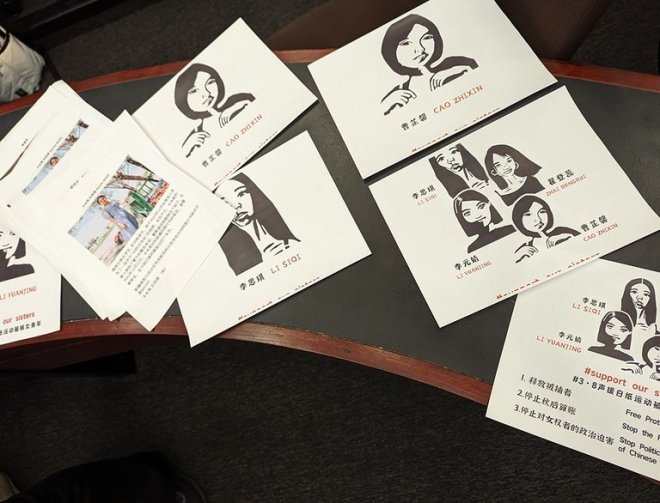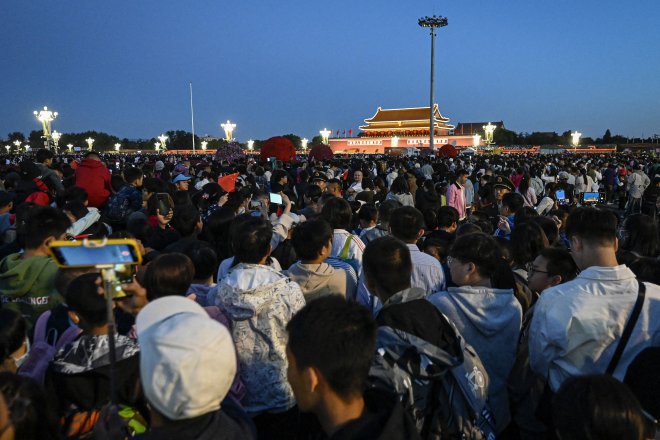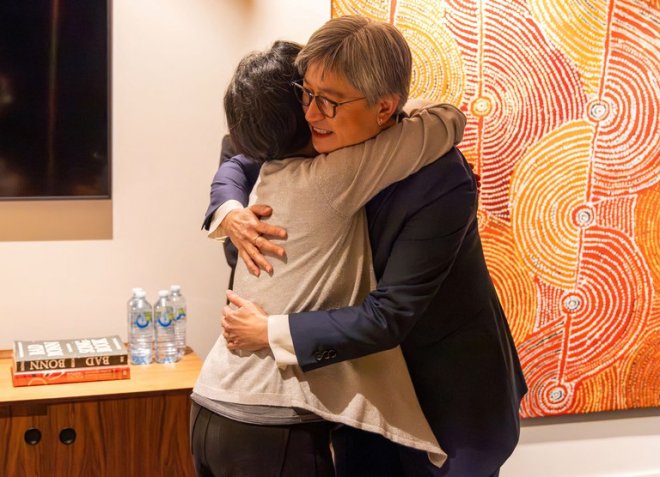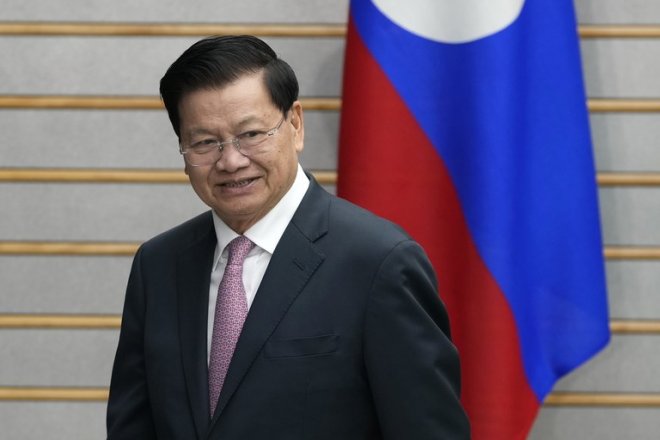Chinese feminist moves to United States, calls for international action
One of China’s “Feminist Five” activists who sparked an international outcry when they were detained ahead of International Women’s Day in 2015, has left the country to take up a position as a visiting scholar in the United States.
Zheng Churan was detained alongside fellow activists Li Tingting, Wu Rongrong, Wei Tingting and Wang Man on March 6, 2015, two days ahead of International Women’s Day, as they planned a campaign against sexual harassment on public transportation, on suspicion of “picking quarrels and stirring up trouble.”
While they were eventually released “on bail” in April 2016, they remained criminal suspects under tight police surveillance and under the threat of prosecution, while at least one of them was prevented from leaving the country.
![]() The Georgetown lecture included postcards that audience members could send to in support of Chinese women who are being detained for their activism, including Cao Zhixin, Li Siqi, Li Yuanjing and Zhai Dengrui. Credit: Mia Ping-chieh Chen/RFA
The Georgetown lecture included postcards that audience members could send to in support of Chinese women who are being detained for their activism, including Cao Zhixin, Li Siqi, Li Yuanjing and Zhai Dengrui. Credit: Mia Ping-chieh Chen/RFA
Much of China’s feminist activism moved online after their detention, only to be targeted in a nationwide “public opinion” cleanup campaign that saw key feminist social media accounts shut down beginning in 2017, although it saw a resurgence with the #MeToo movement, whose activists have also been detained and prevented from traveling outside mainland China.
“It was a pretty big victory for me that I was able to get out of there in reasonably good health,” Zheng told an April 8 Georgetown University lecture titled “Unleashing the Power of Feminist Activism in China,” in her first public appearance since arriving in the United States a month ago.
“What activism taught me was how to see new possibilities, how to find hope in small victories and how to keep fighting,” she said.
‘Success is a process’
Wearing a black T-shirt emblazoned with the words “This is what a feminist looks like” in Chinese, Zheng retains the same intensity she had when campaigning online for the release of her detained labor activist husband Wei Zhili by taking up running and logging her daily workouts as a way to draw attention to his situation.
“I don’t think the [women"s rights] movement has to reach some kind of end point, or milestone, to be regarded as a success,” Zheng said in an interview after the lecture. “In my opinion, success is a process.”
“Activism changes the way people think, and how they look at the world, and shows them how to use their worldview as guidance in living their lives,” she said. “That’s the most important thing.”
Zheng’s lecture also included a call on audience members to pen postcards in support of Chinese women currently detained for their activism, particularly the young women detained in the wake of the “white paper” protests in November 2022.
![]() Lecture attendees address postcards in support of detained Chinese female activists. Credit: Mia Ping-chieh Chen/RFA
Lecture attendees address postcards in support of detained Chinese female activists. Credit: Mia Ping-chieh Chen/RFA
Participants sent postcards to “white paper” movement supporters Cao Zhixin, Li Siqi, Li Yuanjing, Zhai Dengrui and Kamile Wayit, and to Wu Yi and other women for visiting “Xiaohuamei,” a woman found chained by the neck in an outbuilding in Jiangsu province’s Feng county last year.
“Actions like these are happening all over the world,” Zheng said. “It will be very heartening [for these women] back in China to know that they haven"t been forgotten.”
She said she continues to draw her greatest inspiration from such actions.
“The biggest inspiration I get from feminism is its actions,” she said. “There are various things we can do to change inequality, and action is a very important use of our power.”
Translated by Luisetta Mudie. Edited by Matt Reed.
[圖擷取自網路,如有疑問請私訊]
Zheng Churan was detained alongside fellow activists Li Tingting, Wu Rongrong, Wei Tingting and Wang Man on March 6, 2015, two days ahead of International Women’s Day, as they planned a campaign against sexual harassment on public transportation, on suspicion of “picking quarrels and stirring up trouble.”
While they were eventually released “on bail” in April 2016, they remained criminal suspects under tight police surveillance and under the threat of prosecution, while at least one of them was prevented from leaving the country.
 The Georgetown lecture included postcards that audience members could send to in support of Chinese women who are being detained for their activism, including Cao Zhixin, Li Siqi, Li Yuanjing and Zhai Dengrui. Credit: Mia Ping-chieh Chen/RFA
The Georgetown lecture included postcards that audience members could send to in support of Chinese women who are being detained for their activism, including Cao Zhixin, Li Siqi, Li Yuanjing and Zhai Dengrui. Credit: Mia Ping-chieh Chen/RFAMuch of China’s feminist activism moved online after their detention, only to be targeted in a nationwide “public opinion” cleanup campaign that saw key feminist social media accounts shut down beginning in 2017, although it saw a resurgence with the #MeToo movement, whose activists have also been detained and prevented from traveling outside mainland China.
“It was a pretty big victory for me that I was able to get out of there in reasonably good health,” Zheng told an April 8 Georgetown University lecture titled “Unleashing the Power of Feminist Activism in China,” in her first public appearance since arriving in the United States a month ago.
“What activism taught me was how to see new possibilities, how to find hope in small victories and how to keep fighting,” she said.
‘Success is a process’
Wearing a black T-shirt emblazoned with the words “This is what a feminist looks like” in Chinese, Zheng retains the same intensity she had when campaigning online for the release of her detained labor activist husband Wei Zhili by taking up running and logging her daily workouts as a way to draw attention to his situation.
“I don’t think the [women"s rights] movement has to reach some kind of end point, or milestone, to be regarded as a success,” Zheng said in an interview after the lecture. “In my opinion, success is a process.”
“Activism changes the way people think, and how they look at the world, and shows them how to use their worldview as guidance in living their lives,” she said. “That’s the most important thing.”
Zheng’s lecture also included a call on audience members to pen postcards in support of Chinese women currently detained for their activism, particularly the young women detained in the wake of the “white paper” protests in November 2022.
 Lecture attendees address postcards in support of detained Chinese female activists. Credit: Mia Ping-chieh Chen/RFA
Lecture attendees address postcards in support of detained Chinese female activists. Credit: Mia Ping-chieh Chen/RFAParticipants sent postcards to “white paper” movement supporters Cao Zhixin, Li Siqi, Li Yuanjing, Zhai Dengrui and Kamile Wayit, and to Wu Yi and other women for visiting “Xiaohuamei,” a woman found chained by the neck in an outbuilding in Jiangsu province’s Feng county last year.
“Actions like these are happening all over the world,” Zheng said. “It will be very heartening [for these women] back in China to know that they haven"t been forgotten.”
She said she continues to draw her greatest inspiration from such actions.
“The biggest inspiration I get from feminism is its actions,” she said. “There are various things we can do to change inequality, and action is a very important use of our power.”
Translated by Luisetta Mudie. Edited by Matt Reed.
[圖擷取自網路,如有疑問請私訊]
|
本篇 |
不想錯過? 請追蹤FB專頁! |
| 喜歡這篇嗎?快分享吧! |
相關文章
AsianNewsCast



















